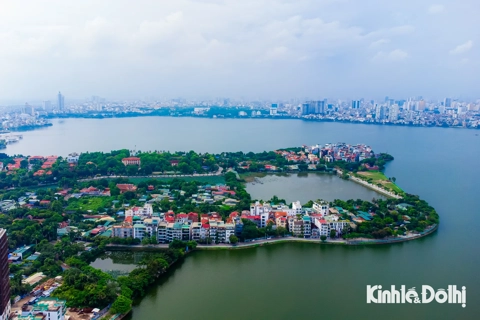Property
Vietnam emerged as hot new market for luxury property: Bloomberg
Feb 19, 2019 / 10:52 AM
In a world where home prices are looking precarious from London to Hong Kong, Sydney and New York, it makes Vietnam an attractive location.
Vietnam’s status as one of the fastest-growing economies has spurred overseas investors to target the nation’s real estate, alongside a rapidly growing cohort of well-heeled domestic buyers, eager to put hard currency into property, Bloomberg reported.
 In a world where home prices are looking precarious from London to Hong Kong, Sydney and New York, it makes Vietnam an attractive location.
In a world where home prices are looking precarious from London to Hong Kong, Sydney and New York, it makes Vietnam an attractive location.
Vietnam is where southern China was 10 or 15 years ago, Goodwin Gaw, chairman of Hong Kong-based private-equity firm Gaw Capital Partners, which oversees US$17 billion in real estate assets globally, told Bloomberg.
It is no longer a sure thing considering home prices have been rising steadily over the past 18 months, but “long term it’s still very good if you’re able to hunker down,” Gaw was quoted by Bloomberg as saying.
Prices for luxury condominiums in Ho Chi Minh City climbed 17% in 2018 to an average of US$5,518 per square meter, according to CBRE Group Inc. The firm forecasts they would climb nearly 10% by early 2020 to US$6,000 per square meter.
While that is almost double the price for a typical high-end apartment in Ho Chi Minh City, it’s a fraction of the cost in Singapore, Tokyo or Hong Kong, the world’s least affordable market.
Ilsang Cho, a spokesman for Hana Tour, a South Korean travel agency that arranges multi-day package tours to Vietnam to visit apartments, said there is huge interest for investing in Vietnam.
While demand from overseas investors remains strong, the latest wave of buyers are Vietnam’s newly prosperous. The number of people with net assets of US$30 million or more increased by 320% from 2006 and 2016, the fastest pace globally ahead of India and China, according to a 2017 report by Knight Frank.
Many Vietnamese have built their wealth with real estate, according to Chris Freund, founder of private-equity firm Mekong Capital. Home ownership rates exceed 90%, one of the highest in the world. Rising values mean there are middle-class families with dwellings in excess of US$1 million.
Neil MacGregor, a managing director at Savills Vietnam, said developers used to focus on the middle class but are now turning their attention to the more affluent. More and more rich Vietnamese, particularly entrepreneurs are looking for places to put their money, MacGregor added.
Another factor driving demand for urban apartments is the shift away from the Asian tradition of several generations living under one roof.
Young couples prefer to escape from their parents after marriage, said Duong Thuy Dung, a senior director at CBRE.
Most Asian businesses always turn to real estate when they become successful in whatever core business they have, according to Andy Ho, chief investment officer at VinaCapital.
When their country’s wealth grows up, people buy real estate, he added.

Vietnam is where southern China was 10 or 15 years ago, Goodwin Gaw, chairman of Hong Kong-based private-equity firm Gaw Capital Partners, which oversees US$17 billion in real estate assets globally, told Bloomberg.
It is no longer a sure thing considering home prices have been rising steadily over the past 18 months, but “long term it’s still very good if you’re able to hunker down,” Gaw was quoted by Bloomberg as saying.
Prices for luxury condominiums in Ho Chi Minh City climbed 17% in 2018 to an average of US$5,518 per square meter, according to CBRE Group Inc. The firm forecasts they would climb nearly 10% by early 2020 to US$6,000 per square meter.
While that is almost double the price for a typical high-end apartment in Ho Chi Minh City, it’s a fraction of the cost in Singapore, Tokyo or Hong Kong, the world’s least affordable market.
Ilsang Cho, a spokesman for Hana Tour, a South Korean travel agency that arranges multi-day package tours to Vietnam to visit apartments, said there is huge interest for investing in Vietnam.
While demand from overseas investors remains strong, the latest wave of buyers are Vietnam’s newly prosperous. The number of people with net assets of US$30 million or more increased by 320% from 2006 and 2016, the fastest pace globally ahead of India and China, according to a 2017 report by Knight Frank.
Many Vietnamese have built their wealth with real estate, according to Chris Freund, founder of private-equity firm Mekong Capital. Home ownership rates exceed 90%, one of the highest in the world. Rising values mean there are middle-class families with dwellings in excess of US$1 million.
Neil MacGregor, a managing director at Savills Vietnam, said developers used to focus on the middle class but are now turning their attention to the more affluent. More and more rich Vietnamese, particularly entrepreneurs are looking for places to put their money, MacGregor added.
Another factor driving demand for urban apartments is the shift away from the Asian tradition of several generations living under one roof.
Young couples prefer to escape from their parents after marriage, said Duong Thuy Dung, a senior director at CBRE.
Most Asian businesses always turn to real estate when they become successful in whatever core business they have, according to Andy Ho, chief investment officer at VinaCapital.
When their country’s wealth grows up, people buy real estate, he added.









